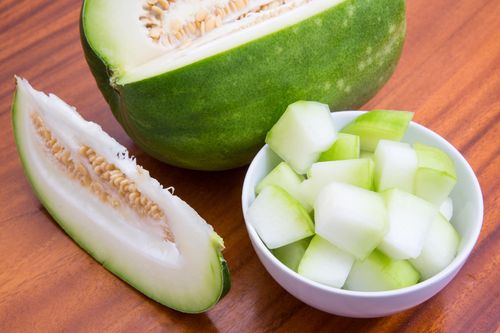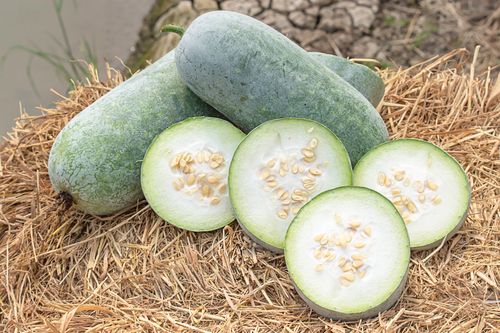Ash Gourd: Benefits, Recipes, and More
Introduction to Ash Gourd
Ash gourd is popularly known as wax gourd, winter melon, and Chinese watermelon. Its botanical name is Benicasa Hispida. It is a green watery vegetable with its roots in South and Southeast Asia. Indian and Chinese cuisines use ash gourds in stews, salads, and curries. Ash gourds have a neutral taste like cucumbers. Hence, many dishes can use this flavor with ease.
Physical Structure
It is a creeper plant by nature. The plant’s bright yellow flowers morph into ash gourd. Uniquely shaped leaves of this creeper have an average height of 15cm. The young flesh of this melon has an oval shape and a sweet taste. A matured ash gourd can be as wide as 30cm.
The Indian variety comes with a rough texture and ash-like coating. Southeast Asian gourds grow with a layer of peach fuzz-like hair. When they mature, the formation of wax in place of the hair occurs. This is the genesis of the name wax gourd. The sticky coating helps to protect the gourd from going bad.
Uses of Ash Gourd
The Ayurveda medicinal system believes ash gourds have immense medicinal properties. Many communities use ash gourd as a home remedy for fever, dysentery, and other illnesses. One such example is the Mizo community of North East India. They treat severe dysenteries with ash gourds. Indian spiritual traditions and yoga are also wide users of this vegetable.
Cambodian and Vietnamese cuisines make pork stews with ash gourds. Chinese consume a candied version of this gourd called winter melon candy. Their New Year’s festival is a place to witness these candies. Different states in India use ash gourds in distinct dishes.
The leaves and stems of the plant are consumable as well.
Nutritional Facts of Ash Gourd
The nutritional values per 100g of uncooked ash gourd are:
- Calories: 13 kcal
- Carbohydrate: 4 g
- Protein: 0.3 g
- Ash: 0.3 g
- Fat: 0.2 g
- Ash gourds are 96% full of water. The remaining 4% constitutes some carbs, proteins, and other nutrients.
- It is a low-calorie vegetable with about 2.9 g of dietary fibre.
- Calcium, magnesium, and phosphorus are present in low quantities in the milligram range.
- Smaller traces of iron, potassium, and zinc are also part of the nutrient list.
- It contains 13 mg of vitamin C, which makes up a good portion of the daily recommended value.
- Ash gourds have high antioxidant contents. The two important antioxidants found in them are carotenoids and flavonoids. They combat heart diseases and certain types of diabetes.
How Does Ash Gourd Help with Weight Loss?
Ash gourds have a connection in aiding weight loss. Many consume it in its liquid form as a detox juice. Some of the reasons for this are:
- It is a fibre rich vegetable. High fibrous foods tend to slow down the rate of digestion.
- Consuming small portions of it can promote a feeling of fullness for long hours.
- It is very low in calories, which allows for their intake in larger quantities as well. It makes a good option to snack on.
- Only 4 grams of carbohydrates are present for every 100 grams of vegetables. Low-carb diets are also helpful to lose weight.
- It contains a negligible amount of fats, which is an added advantage.
- Vitamin B2 present in it provides increased energy levels for workouts.
- Potassium in ash gourd acts as a diuretic. It helps to avoid water retention and bloating.
- Stress eating is a major cause of weight gain. Ash gourds contain riboflavin, which helps to regulate stress hormones. Riboflavin also manages thyroid levels.
10 Health Benefits of Ash Gourd
1. Aids in better digestion
Since the vegetable is mostly made of water, it gets digested with ease. The high fibre content merely slows down the process. It does not make it harder to digest. Fibrous foods are known to relieve constipation and bloating. The low-calorie contents are simpler to digest.
2. Improves lung health
Ash gourds help with loosening phlegm formation in the lungs and nose. This is due to an expectorant property of the vegetable. It improves breathing and prevents any excess mucus secretion.
3. Increases energy levels
Vitamin B3 present in ash gourds increases energy levels. Those who suffer from anemia and body weakness can consume ash gourds regularly.
4. Treats ulcers naturally
Ash gourds prevent the stomach lining from rupturing. It is believed to cure peptic ulcers. They contain anti-microbial properties. It helps to eliminate harmful germs and bacteria in the stomach and intestine.
5. Contains anti-coagulant properties
This means ash gourd can stop excessive bleeding by thickening the blood. It is useful for those who consume blood thinners. It can also stop internal bleeding quickly. Continuous intake of ash gourd may stop regular nosebleeds.
6. Provides a cooling effect
Similar to cucumbers, ash gourds provide a cooling effect. It makes it ideal for consumption during summers. Cooling of the body is also related to increased sharpness of the mind.
7. Relaxes the body
Ash gourds contain mild sedative properties. It helps the body to relax and unwind. Health issues like anxiety and insomnia get resolved with the continuous use of ash gourds.
8. Regulates excretory system
The fibre content regulates bowel movements. Ash gourd also helps to detoxify kidneys. It promotes regular working of the bladder.
9. Treats dandruff
The cooling property of ash gourds can help to soothe irritated scalp. It eliminates dandruff-causing fungus. You can apply it to the scalp in gel form regularly. It also helps to moisturize dry hair.
10. Contains moisturizing property
The gel version of ash gourds has hydrating and moisturizing properties. Apply it to the skin regularly for best results. It can calm down irritated and sun-burnt skin.
Ways to Consume Ash Gourd
There are multiple ways to consume ash gourds. From elaborate Indian-style curries to a basic juice, its use is versatile. Two simple recipes using ash gourds are given below.
Recipe 1 – Ash gourd raita
Ash Gourd Raita is a healthy and delicious South Indian accompaniment made from ash gourd and yogurt.
Ingredients:
- ash gourd grated – 1 cup
- yoghurt whisked – ½ cup
- Salt to taste
- coriander leaves chopped – 1 tbsp
For Tempering:
- Coconut oil or ghee – 1 tbsp
- Mustard seeds – ½ tsp
- Urad dal – 1 tsp
- Few curry leaves
- Green chili chopped – 1
- A pinch of hing (asafoetida)
Method:
- Peel the skin of ash gourd. Remove all seeds from inside and grate it.
- Whisk the yogurt or curd in a mixing bowl. Add grated raw ash gourd and salt. Mix well.
- Heat oil in a pan. Add mustard seeds. Let them splutter.
- Then add green chilies, curry leaves, asafoetida, and saute for few seconds.
- Pour the tempering over the ash gourd and curd mix.
- Serve with rice or roti.
Recipe 2 – Ash gourd detox drink
This drink is an excellent detoxifier and can be consumed in the morning on an empty stomach.
Ingredients:
- Ash gourd cut in cubes – 1/2 cup
- Coriander leaves – a handful
- Ginger – 1-inch piece
- Lemon juice – 1 tbsp
- Cumin Powder – 1/4 tsp
- Black salt – 1/4 tsp optional
- Water – 1 cup
Method:
- Blend all the ingredients and serve immediately.
Conclusion
Ash gourds are very low in calories but high in fibre. Traditionally, it finds its usage as a home remedy in many Asian countries. The medicinal values of winter melon have been recognized in Ayurveda. Chinese and Indian cuisines widely use ash gourds for various dishes.
Its nutritional values help to fight constipation, stomach ulcers, and digestion issues. Ash gourds aid in weight loss as well. Its cooling properties relax the body. Hydrated body and internal organs, and that reflect in your skin and hair quality.
Add ash gourds to your recipes for a healthy twist. Its low-calorie and neutral taste are bound to be beneficial. The bottom line is continuous consumption of ash gourds will elevate your health and skin quality.
Frequently Asked Questions (FAQs)
A. Yes, ash gourd can be consumed any time of the year.
A. It should be juiced raw and consumed immediately to reap the benefits.
A. Starting the day with a glass of ash gourd juice has many benefits. It helps to kick-start the metabolism as well as detoxification. It also increases energy levels and keeps one alert.
A. Since winter melon grows in a warm tropical climate, it is often ideal as a cooling vegetable in the summers. Winter melon application can also soothe irritated skin as well as sunburns in summers.
A. Ash gourd has 86.2 calories per 100 gms.




